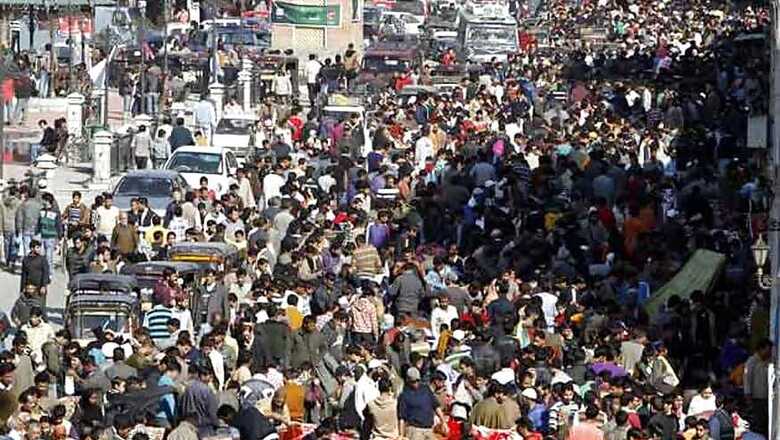
views
The National Population Register (NPR) exercise will be carried out in every state, except Assam, from April this year and is planned to be completed by September. The NPR exercise will be carried out along with the house listing phase of the census. The Union Cabinet in December last year had announced allocation of Rs 3,941.35 crore for updating NPR.
With many still having no clarity on the exercise, here is all you need to know:
What is NPR?
The NPR is a list of "usual residents" of the country.
It is compulsory for every usual resident of India to register in the NPR. This includes both Indian citizens as well as a foreign citizen. The objective of the NPR is to create a database of every usual resident in the country. It is being prepared at the local (village/sub-town), sub-district, district, state and national level under provisions of the Citizenship Act 1955 and the Citizenship (Registration of Citizens and issue of National Identity Cards) Rules, 2003.
The data for National Population Register was first collected in 2010 by the then UPA government and it is to be done every 10 years.
Who is a 'Usual Resident'?
A "usual resident" is defined for the purposes of NPR as a person who has resided in a local area for the past six months or more or a person who intends to reside in that area for the next six months or more.
What Information Will be Conducted Under NPR?
The database would contain demographic particulars such as:
- Name
- Relationship to head of household
- Father's name
- Mother's name
- Spouse's name (if married)
- Sex
- Date of birth
- Marital status
- Place of birth
- Nationality (as declared)
- Present address of usual residence
- Duration of stay at present address
- Permanent residential address
- Occupation
- Educational qualification
What Documents are Required for NPR?
According to Home Minister Amit Shah's statement to news agency ANI, NPR information will be self-attested, that is, whatever information is provided by the respondent will be deemed correct and no documents or biometric would be required. However, according to several reports, respondents having identification documents like passport and Aadhaar will have to provide the same during the time of collection.
Sources in the ministry of home affairs also cited that rules authorise officials to impose a penalty of Rs 1,000 in case someone refuses to give information for NPR or deliberately gives wrong information.
“Rule 17 of the citizenship rules states that a penalty of Rs 1,000 can be imposed for wrong information,” an MHA official said. However, the official also pointed out that the provision has not been used so far in the NPRs of 2011 and 2015.
NPR officials also said in their pre-test, no respondent had shown any hesitation in sharing their Aadhaar, voter ID, driving licence or passport details. The only objection from some quarters was to the PAN number.
“Because of the objection we have decided to do away with the column on pan card," an official said.
Will NPR Lead to NRC?
Several opposition leaders have stated that NPR may be laying the foundation for NRC.
However, Home Minister Amit Shah stated otherwise. "It is possible that some names are missed in the NPR, still their citizenship will not be revoked because this is not the process of NRC. The NRC is a different process. I want to make it clear that nobody will lose citizenship because of NPR," Shah told ANI.
The home minister's statement came amid controversy that NPR was the first step towards NRC. Several opposition leaders requested CMs to boycott the NPR process to avoid NRC.
The home ministry officials have also said that there is no plan to use data collected during NPR to form the basis of NRC.
What is the Difference Between NPR and NRC?
National Population Register is a database of people living in India, citizens or otherwise, but National Register of Citizens is a database of Indian citizens. The NRC process demands proof of citizenship from the respondents. Those found without proof may face action.
In a statement to news agency ANI, Home Minister Amit Shah said, “There is no link between National Register of Citizens (NRC) and National Population Register (NPR).”
What is the Difference Between NPR and Census?
While the process of NPR and Census will begin simultaneously, the two databases are not same.
The census is the largest single source of a variety of statistical information on different characteristics of the people of India while NPR only contains demographic information. More details are required for census like information on demography, economic activity, literacy and education, and housing and household amenities besides others.
The census is the basis for reviewing the country's progress in the past decade, monitoring the ongoing schemes of the government and plan for the future.
The enumerators also collect data related to cultivators and agricultural labourers, their sex, occupational classification of workers in the non-households industry, trade, business, profession or service by class of worker and sex.
There will be a detailed survey on gender and literacy rate, a number of towns, slum households and their population. Information is also collected on sources of potable water, energy, irrigation, method of farming, whether a house is a concrete, thatched or others.
The census, 2021 will be done in two phases. In the first phase, the work of house-listing or housing census will be conducted from April to September 2020. In the second phase, the enumeration of the population will be done from February 9 to February 28, 2021, with reference moment as 00:00 hours of March 1, 2021.
Why NPR if Census Exists?
Officials in the Ministry of Home Affairs state that NPR helps identify the current demographics of actual residents who will be direct beneficiaries of any schemes launched in the area.


















Comments
0 comment